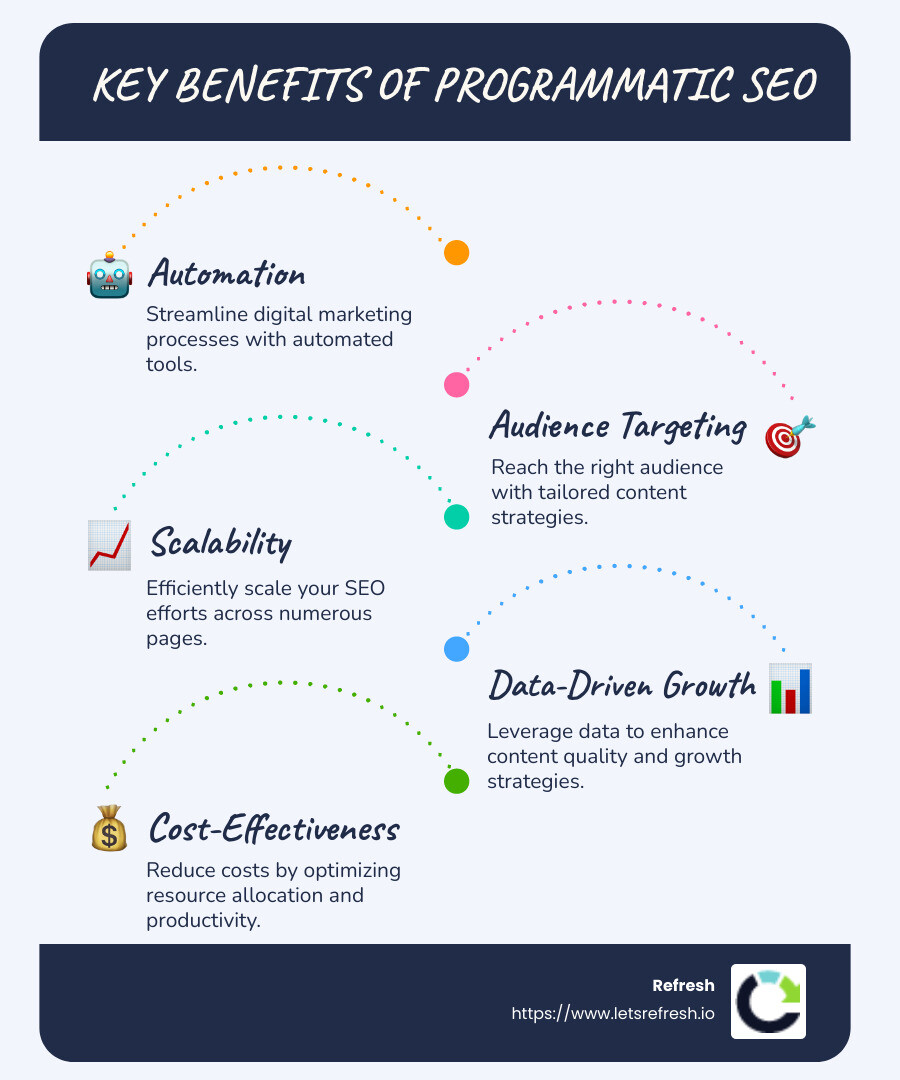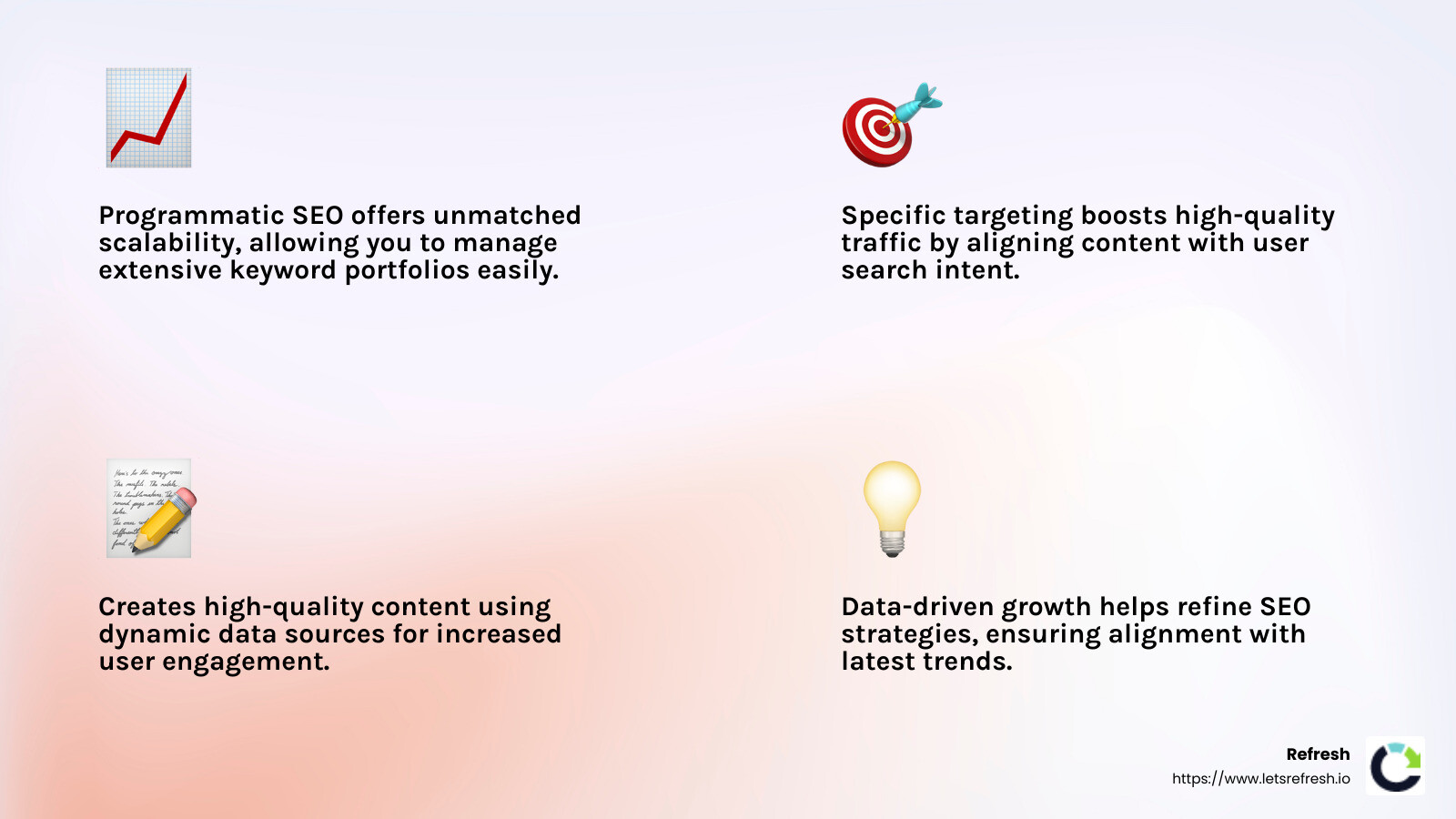July 24, 2025
Programmatic SEO agency could be your shortcut to optimized digital marketing success. Wondering why? It's because programmatic SEO uses automation to boost your SEO strategy. With the power of big data, AI tools, and dynamic page templates, this approach helps tailor content and reach your audience more efficiently than ever. Instead of using traditional, time-consuming methods, programmatic SEO allows for large-scale optimization, targeting the right keywords and audience at the click of a button. This means you'll be able to improve your online visibility and attract more customers, without losing focus on your core business operations.
Why Choose a programmatic SEO agency?
- Automate and streamline your digital marketing.
- Use vast datasets and AI-driven strategies.
- Improve online visibility and grow your audience.
- Save time with large-scale optimization.
By leveraging a programmatic SEO agency, your tech startup can leave outdated SEO tactics in the past, focusing instead on modern and efficient strategies. My name is Alexander Palmiere, and as the founder and CEO of Refresh Digital Strategy, I've helped countless businesses thrive by integrating programmatic SEO into their digital strategies. Let's explore how we can transform your SEO approach next.

What is Programmatic SEO?
Programmatic SEO is a game-changer in digital marketing. It uses automation and AI tools to optimize websites on a large scale. This method helps businesses create and manage thousands of web pages with ease, making SEO more efficient and effective.
Automation and Large-Scale Optimization
In traditional SEO, much of the work is done manually. This can be slow and labor-intensive. Programmatic SEO changes that by automating repetitive tasks. With automation, you can generate and update a vast number of pages quickly. This is especially useful for eCommerce sites and SaaS platforms that have extensive product listings or service offerings.
AI Tools and Dynamic Page Templates
Dynamic page templates are a core component of programmatic SEO. These templates allow you to create multiple pages with consistent design and structure, but with unique content. AI tools improve this by analyzing data to ensure each page is relevant and optimized for search engines. These tools help in crafting content that matches user intent, which is crucial for improving rankings.
Keyword Targeting
Effective keyword targeting is another advantage of programmatic SEO. By using AI and data analysis, you can identify the best keywords for your business. This means you can tailor your content to match what your audience is searching for. The result? Higher search engine rankings and more traffic to your site.
Programmatic SEO is all about working smarter, not harder. By automating processes and using AI, you can focus on creating high-quality content that attracts and engages your audience. This approach not only saves time but also ensures your SEO strategy is robust and scalable.
Benefits of Programmatic SEO
Scalability is one of the standout benefits of using a programmatic SEO agency. With automation, you can handle extensive keyword portfolios and numerous landing pages effortlessly. This allows businesses to expand their online presence without sacrificing quality. It's like having a team that never sleeps, continually working to improve your site's visibility.
Imagine a retail site with thousands of products. Manually optimizing each page would be a daunting task. Programmatic SEO, however, automates this process, making it possible to scale your efforts efficiently. This means reaching a broader audience faster.
Specific Targeting is another major advantage. By leveraging big data, programmatic SEO allows you to fine-tune your content to meet specific search intents. This precision increases the likelihood of attracting high-quality traffic. For instance, an eCommerce platform can target users searching for "best running shoes for flat feet" with custom content, improving their chances of conversion.
High-Quality Content creation becomes more manageable with programmatic SEO. Using dynamic data sources, you can ensure that the content is not only relevant but also engaging. This data-driven approach helps in identifying trends and user needs, allowing you to stay ahead of the curve. The result is increased user engagement and improved search rankings.
Data-Driven Growth is at the heart of programmatic SEO. By analyzing insights from search engines, competitors, and performance metrics, you can continuously refine your strategy. This means your SEO efforts are always aligned with the latest trends and user behavior, leading to sustained growth.
The efficiency of programmatic SEO cannot be overstated. By automating repetitive tasks like keyword research and content creation, you free up valuable time. This allows you to focus on strategic planning and data analysis, ultimately driving better ROI.
Finally, cost-effectiveness makes programmatic SEO an attractive option. While there is an initial investment in technology and data gathering, the long-term savings are significant. Automation reduces the need for manual labor, minimizing human error and optimizing resource allocation. This ensures that your SEO initiatives deliver maximum return on investment.

In summary, programmatic SEO offers a robust, scalable, and cost-effective approach to digital marketing. By leveraging automation and data insights, businesses can achieve specific targeting, high-quality content creation, and sustained growth. This makes it an essential tool for any modern marketing strategy.
How to Build a Programmatic SEO Campaign
Building a programmatic SEO campaign involves several key steps that can help streamline and optimize your digital marketing efforts. Let's break down each component:
Keyword Research
Start with a solid foundation by identifying the right keywords. Begin with a broad list of potential keywords related to your business. Use tools like Ahrefs to generate more ideas and refine your list. Look for terms that not only have high search volume but also align with the search intent of your target audience. This ensures you're focusing on keywords that can drive valuable traffic to your site.
Dynamic Entities
Next, identify dynamic entities that can serve as modifiers for your keywords. These are variables that can change based on user intent or context, such as location, product specifications, or user demographics. Incorporating dynamic entities allows you to create content that is highly relevant and custom to specific user needs.
Data Sets
Use existing data sets or gather new ones through web scraping, API integration, or manual collection. These data sets provide the content that will populate your pages. Make sure the data is accurate, up-to-date, and comprehensive. This data-driven approach is crucial for creating content that resonates with your audience and meets their search queries effectively.
Page Templates
Design a dynamic page template that can be used across your site. This template should include placeholders for dynamic content and be optimized for SEO. Elements like title tags, meta descriptions, and headings should be structured based on your keyword research. Creating a robust template ensures consistency and efficiency as you scale your content production.
Bulk Content Generation
With your data sets and templates ready, you can move on to generating content in bulk. Use automation tools to populate your templates with data, creating numerous pages quickly. This process not only saves time but also ensures that each page is optimized for search engines and user intent.
Publishing
Finally, publish your content and ensure it is indexed by search engines. This involves submitting your pages to Google and other search engines, verifying that all SEO elements are in place, and monitoring the performance of your pages. Regularly updating and refreshing your content can help maintain its relevance and ranking over time.
By following these steps, you can build a programmatic SEO campaign that is efficient, scalable, and highly effective. This approach allows you to focus on strategic growth while automating repetitive tasks, ultimately enhancing your digital presence and driving more organic traffic.
In the next section, we'll explore how programmatic SEO strategies differ across various industries, including SaaS and eCommerce...
Programmatic SEO Strategy for Different Industries
When it comes to implementing a programmatic SEO strategy, the approach can differ significantly based on the industry. Whether you're in SaaS, eCommerce, or another sector, there's a unique angle to consider. Let’s explore how these strategies can be custom for different industries:
SaaS Platforms
For SaaS companies, programmatic SEO can be a game-changer. The focus here is often on best software pages, comparison pages, and integration pages. For example, a SaaS company might create pages like "Best CRM Software for Small Businesses" or "Salesforce vs HubSpot: Which Is Best for Your Business?" These pages cater to potential customers searching for solutions or comparing options. Utilizing data from software marketplaces like G2 or Capterra can provide insights into what users are searching for, allowing for precise keyword targeting and content creation.
eCommerce Stores
In the eCommerce world, the strategy revolves around product pages, category pages, and product comparison pages. An eCommerce store might use programmatic SEO to create pages like "Best Running Shoes of 2024" or "Nike vs Adidas: Which Brand Offers Better Value?" By leveraging product information management systems and data from platforms like Amazon, stores can generate content that targets specific product attributes, brands, and consumer questions. This not only improves search visibility but also improves the shopping experience by providing valuable information to potential buyers.
Product Comparisons
Product comparison pages are crucial across multiple industries. They help users make informed decisions by comparing features, pricing, and benefits. For instance, a page comparing "iPhone 14 vs Samsung Galaxy S23" provides users with detailed insights into two competing products. These pages often rank well because they align closely with user search intent and provide comprehensive information in one place.
Location Pages
For businesses with a physical presence or service area, location pages are key. These can include pages like "Best Italian Restaurants in New York" or "Top Plumbers in Los Angeles." Creating these pages involves integrating local SEO techniques, such as using location-specific keywords and optimizing for Google My Business. This approach helps attract local customers by improving visibility in regional searches.
Glossaries and Industry-Specific Pages
Glossaries and industry-specific pages can position a business as an authority in its field. For example, a tech company might create a glossary of technical terms or a series of pages explaining industry trends. These pages provide value to users by educating them and can attract traffic from informational searches. By using programmatic SEO, businesses can efficiently generate a wide array of such pages, each targeting different terms or topics within their industry.
By tailoring your programmatic SEO strategy to fit the unique needs of your industry, you can create content that not only ranks well but also resonates with your target audience. This approach ensures that your efforts are both effective and sustainable, driving growth and visibility in the digital space.
In the next section, we'll dive into the differences between programmatic and traditional SEO approaches...
Programmatic SEO vs Traditional SEO
When it comes to improving online visibility, both programmatic SEO and traditional SEO have their merits. However, they differ significantly in execution and outcomes. Let's break down these differences:
Manual Processes vs Automation
Traditional SEO relies heavily on manual processes. Marketers conduct keyword research, optimize content, and track performance by hand. While this can be effective, it's often time-consuming and labor-intensive, especially for large websites.
In contrast, programmatic SEO leverages automation. By using AI-driven algorithms and dynamic data integration, it streamlines the optimization process. This means marketers can quickly adjust strategies and focus on more strategic tasks.
Scalability
Scaling efforts is a major challenge for traditional SEO. Handling numerous keywords and pages manually can become overwhelming as the campaign grows.
Programmatic SEO shines in scalability. Automation allows for the management of extensive keyword portfolios and thousands of landing pages with ease. This ensures that as your business grows, your SEO strategy can keep pace without a hitch.
Targeting
Traditional SEO often targets broad keywords to capture a wide audience. While this can drive traffic, it may lack the precision needed to engage users effectively.
With programmatic SEO, ultra-specific targeting is possible. By tailoring content to match precise search intents, marketers can deliver personalized experiences. This not only boosts engagement but also conversion rates.
Adaptability
Adapting to changes is another area where these approaches differ. Traditional SEO can be slow to respond to shifts in search algorithms or market trends, as manual adjustments take time.
On the other hand, programmatic SEO is highly adaptable. Automation and bulk editing capabilities enable swift responses to changes, ensuring your strategy remains effective over time.
In summary, while traditional SEO remains valuable, programmatic SEO offers a more efficient, scalable, and targeted approach. It's about working smarter, not harder, to achieve your digital marketing goals.
Next, we'll address some frequently asked questions about programmatic SEO...
Frequently Asked Questions about Programmatic SEO
What is the cost of programmatic SEO?
The cost of programmatic SEO can vary widely based on several factors. Key considerations include the size of your business, the scope of your project, and the specific SEO provider you choose. For small businesses, initial investments may focus on data gathering and technology setup. Larger enterprises might require more extensive resources and ongoing management.
Typically, costs are offset by the efficiencies and results achieved through automation. By reducing manual labor, programmatic SEO can maximize your ROI over time. During an initial consultation, a provider will usually offer a customized proposal, outlining expected costs and potential returns.
What is the salary of a programmatic SEO expert?
Salaries for programmatic SEO experts can differ depending on experience, location, and industry standards. According to industry data, the median salary for an SEO specialist ranges from $53,000 to $91,000 per year. However, experts in programmatic SEO, with their specialized skills in automation and data-driven strategies, may command higher salaries, especially in competitive markets.
Freelancers or consultants in programmatic SEO might earn differently, often based on project scope or performance-based fees. As programmatic SEO continues to grow, demand for skilled professionals in this field is likely to increase, potentially driving salaries higher.
What is the difference between programmatic SEO and traditional SEO?
The primary difference between programmatic SEO and traditional SEO lies in the approach to optimization. Traditional SEO is manual, involving hands-on keyword research, content creation, and performance tracking. This can be effective but is often time-consuming and less scalable.
Programmatic SEO, however, leverages automation to streamline these tasks. It uses AI and dynamic data to optimize content at scale, allowing for precise targeting and quick adaptation to changes. This makes it more efficient and scalable, particularly for large websites aiming to reach specific search intents.
While traditional SEO focuses on manual optimization, programmatic SEO automates the process, offering a more flexible and scalable solution. This approach aligns with modern digital marketing strategies, emphasizing efficiency and data-driven decision-making.
Next, we'll dive into how Refresh can help you leverage programmatic SEO for long-term success...
Conclusion
At Refresh, we understand that the digital landscape is constantly evolving. This is why we focus on providing comprehensive digital marketing solutions custom to the unique needs of small to medium-sized businesses. Our approach combines innovative Webflow development with a strong emphasis on programmatic SEO, ensuring that your online presence is both impactful and sustainable.
Digital Marketing and Webflow Development
Our team specializes in crafting visually stunning and SEO-friendly websites using Webflow. This platform allows us to create responsive, dynamic sites that not only look great but also perform exceptionally well in search engines. By integrating programmatic SEO strategies, we ensure your content is always relevant and optimized for organic traffic growth.
Long-Term Partnerships
We believe in building long-term partnerships with our clients. This means we are dedicated to your success, offering ongoing support and continuous optimization of your digital strategies. Our expert team is always ready to adapt to the latest trends and technologies, ensuring your business stays ahead of the competition.
Expert Support
With Refresh, you're not just getting a service provider; you're gaining a partner who is invested in your growth. Our expert support extends beyond just technical SEO. We offer guidance on branding, social media management, and overall digital marketing strategies. This holistic approach ensures that every aspect of your online presence works together to drive results.
By choosing Refresh, you're opting for a partner committed to helping you steer the complexities of digital marketing with ease. Let's scale together and achieve faster, more efficient growth.
Ready to boost your digital presence with our expert support? Explore our Programmatic SEO services and see how we can help your business thrive.
Still have questions? Let’s talk about it.
.avif)





